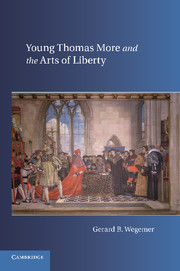Book contents
- Frontmatter
- Contents
- List of Illustrations
- Acknowledgments
- List of Abbreviations
- 1 Young Thomas More
- 2 Fashioning Peace and Prosperity
- 3 Cicero's and More's First Citizens
- 4 More's Earliest Views of Humanitas, Libertas, and Respublica, 1500–1506
- 5 More's Life of Pico della Mirandola (c. 1504–1507)
- 6 More's 1509 Coronation Ode
- 7 Political Poems of 1509–1516
- 8 Richard III
- 9 Utopia
- 10 The Un-Utopian Thomas More Family Portrait
- 11 The Arts of Liberty
- Works Cited
- Index
4 - More's Earliest Views of Humanitas, Libertas, and Respublica, 1500–1506
Published online by Cambridge University Press: 25 October 2011
- Frontmatter
- Contents
- List of Illustrations
- Acknowledgments
- List of Abbreviations
- 1 Young Thomas More
- 2 Fashioning Peace and Prosperity
- 3 Cicero's and More's First Citizens
- 4 More's Earliest Views of Humanitas, Libertas, and Respublica, 1500–1506
- 5 More's Life of Pico della Mirandola (c. 1504–1507)
- 6 More's 1509 Coronation Ode
- 7 Political Poems of 1509–1516
- 8 Richard III
- 9 Utopia
- 10 The Un-Utopian Thomas More Family Portrait
- 11 The Arts of Liberty
- Works Cited
- Index
Summary
[C]hoose which ye list, / Stately fortune or humble poverty: / … bondage or free liberty.
Thomas More, “Fortune Verses” (c. 1504)The life of the ordinary private citizen [priuatus] is best, and most prudent.
Thomas More's translation/emendation of Lucian, Menippus (1506)The law is very ready to hire a tyrannicide. … But when it says tyrannicide, judges of the jury, it seeks a resourceful person, … able in stratagem [consilio] rather than force; one who knows how to lay plots, hide his traps, make the most of his opportunities. … [But] the republic had fallen into the gravest danger, first because of this man's rashness, then by his cowardice. … [T]he gods wanted [this city] to be free [liberam].
Thomas More, Declamation in Reply to Lucian (1506)What is humanitas? What is the fullest and best way of life? This issue is addressed repeatedly in More's earliest poems and in the humorous and subtle dialogues by Lucian that More translated and which became his first published and internationally acclaimed work.
Elements of Thomas More's distinctive humanitas – elements such as love for liberty, hatred of tyranny, and care for rhetoric and declamation – Erasmus noted in his first description of More, pointing out that More worked for years to acquire the extraordinarily difficult and rare skills needed for rhetorical excellence (as also explained in Cicero's De Oratore).
The need for skill young More makes clear in his early poem “A Merry Jest,” which opens with these lines:
Wise men alway,
Affirm and say,
That best is for a man:
Diligently,
For to apply,
The business that he can,
And in no wise,
To enterprise
Another faculty,
For he that will,
And can no skill,
Is never like to the [i.e., thrive or prosper].
- Type
- Chapter
- Information
- Young Thomas More and the Arts of Liberty , pp. 53 - 69Publisher: Cambridge University PressPrint publication year: 2011



